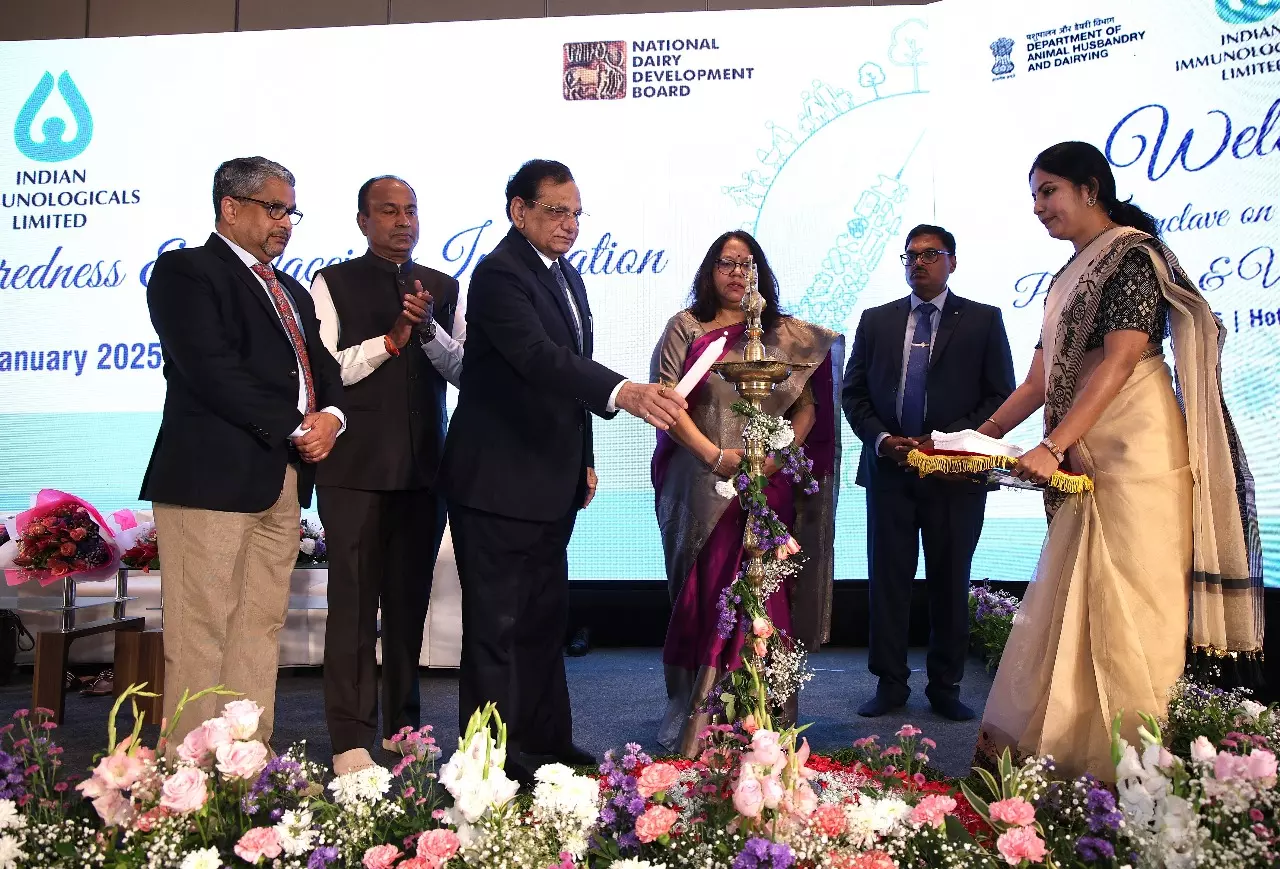Indian Immunologicals Ltd hosts pandemic preparedness conclave in Hyderabad

Indian Immunologicals Limited (IIL), in collaboration with the Department of Animal Husbandry and Dairying, and the National Dairy Development Board (NDDB), recently conducted a highly anticipated conclave on pandemic preparedness and vaccine innovation in Hyderabad. The event brought together a diverse range of stakeholders from the fields of animal health, human health, regulatory affairs, and vaccine innovation, to discuss critical topics aimed at enhancing global pandemic preparedness.
The conclave featured a comprehensive agenda, including discussions on animal health, resilient supply chains for pandemic preparedness, the role of artificial intelligence in healthcare, regulatory matters, and cutting-edge innovations like cell and gene therapy vaccines.
Among the key speakers were Dr Vinod K. Paul, member-health, NITI Aayog; Alka Upadhyaya, secretary of the department of animal husbandry and dairying, Dr Abhijit Mitra, animal husbandry commissioner; Rama Shankar Sinha, joint secretary, department of animal husbandry; Dr Sanjay Shukla, member secretary of the central zoo authority; and Dr B.R. Gulati, sirector of NIVEDI. Many experts from the healthcare sector, vaccine industry stakeholders, and officials from the Central Drugs Standard Control Organization (CDSCO) also participated in the discussions.
Reflecting on the recent pandemic, which brought global economies and healthcare systems to their knees, Dr K. Anand Kumar, managing director of Indian Immunologicals Ltd, emphasised the importance of being better prepared for future pandemics. “The Covid-19 pandemic, though devastating, has taught us valuable lessons on resilience and the importance of preparedness,” he noted.
The historical context of the conclave highlighted the significant impact of animal health on global economies. India, home to more than 20 percent of the world’s livestock, has faced challenges in the past, particularly during the 1970s when diseases like Foot and Mouth Disease severely impacted the country's livestock productivity. The nation’s dairy and livestock sector contributes significantly to its GDP, and improving animal health remains crucial for food security and economic growth. The conclave underscored the need for innovative research and collaborative efforts to tackle both human and animal health challenges effectively.
India has long been known as the “vaccine hub” of the world, with over 60 percent of global vaccines being manufactured in the country. Hyderabad, in particular, is recognized as the vaccine capital, housing more than 50 percent of the country's vaccine manufacturers. Indian Immunologicals Ltd has played a pivotal role in vaccine research and development, not only for human vaccines but also for animal health. During the Covid-19 pandemic, IIL was one of the first to roll out a vaccine drug substance in record time, saving millions of lives in the process.
The conclave aimed to foster collaboration among experts and explore the learnings from past pandemics to strengthen healthcare systems globally. Various experts, including representatives from the Food and Agriculture Organization (FAO) and Coalition for Epidemic Preparedness Innovations (CEPI), shared insights on how to build more resilient healthcare systems and prevent future outbreaks.
To address environmental concerns, IIL took a significant step by planting 141 trees to make the event carbon neutral, showcasing its commitment to sustainability and reducing its environmental footprint.
In his remarks, Dr V.K. Paul highlighted the importance of a “One Health” approach, integrating human, animal, and environmental health for more effective pandemic preparedness. He emphasised that a 100-day timeline for preparedness is a practical goal for future outbreaks. Alka Upadhyaya, in her speech, called for more investment in animal health to ensure better productivity and more effective supply chains. She also stressed the importance of improving cold chain systems for the last mile delivery of vaccines and medicines.
Dr Abhijit Mitra focused on the issue of vaccine security and the need for pre-qualification standards for animal vaccines, highlighting the importance of quality assurance in ensuring the efficacy and safety of vaccines.
Dr Anand Kumar, in his closing remarks, reiterated IIL’s commitment to the nation’s self-sufficiency in vaccines and the company’s role in providing affordable and life-saving vaccines. He concluded, “We are at a crossroads, and it is only through collective effort that we will choose the right path to tackle the challenges that lie ahead.”
The conclave concluded with a call for greater collaboration, innovation, and investment in pandemic preparedness, marking a significant step towards strengthening both human and animal health systems in India and around the world.

